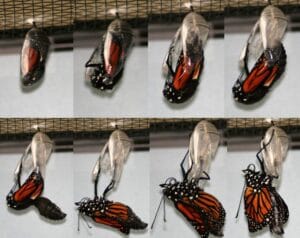The monarch butterfly is one of the most recognizable and well studied butterflies on the planet. Famous for their seasonal migration, millions of monarchs migrate from the United States and Canada south to California and Mexico for the winter the future of these iconic creatures is in danger. Western monarchs have declined by more than 99 percent since the 1980s. Eastern monarchs have declined by an estimated 80 percent. (National Geographic)
There are numerous community science projects that volunteers can do to help scientists learn more about and conserve monarch butterflies. These projects focus on different life stages, times of year, and research questions, and they all have been important for improving understanding of monarch biology and ecology and for giving community members an opportunity for hands-on learning about monarchs. In this session, we will talk about at least five of these projects (the Monarch Larva Monitoring Project, Journey North, Monarch Watch, Project Monarch Health, and the Integrated Monarch Monitoring Program), what each requires, and how you can be involved with one or all of them!
Community Science is the collaboration of everyday citizens and trained scientists to advance scientific knowledge. Community scientists can help the scientific community in myriad ways including data collection and data analysis. For scientists who don’t have the time or access to do research the way they want to, citizen scientists are stepping in to fill the gap.
NHSM is committed to supporting ongoing research by serving as a community scientist pipeline.
These presentations are free to attend. You will have the opportunity to donate financially to NHSM during the registration process. Zoom meeting information will be sent upon registration.
To register for this event, please follow this link: https://www.marylandnature.org/get-involved/events/event/monarch-butterfly-community-science-project-sampler/

